Facing an assault charge in Texas is no small matter. From strained relationships to possible jail time, the consequences can spiral fast. That’s why it’s crucial to understand your rights and the defenses available. If you’re wondering what defenses can be used in Texas for assault allegations, you’re already taking the first step toward protecting your future.
In this in-depth guide titled Exploring Legal Defenses Against Assault Allegations in Texas: Your Comprehensive Guide, we’ll break down the most common and effective legal strategies that Texas courts recognize. We’ll use real-world examples, walk through how courts evaluate these cases, and show you how the right defense can change everything. Whether you’re facing misdemeanor assault or a more serious felony charge, this guide is here to help you make informed choices.

Understanding Assault Under Texas Law
What Counts as Assault in Texas?
Before diving into legal defenses, it’s important to understand how Texas defines assault. Under Texas Penal Code §22.01, assault can include:
- Intentionally, knowingly, or recklessly causing bodily injury to another person
- Threatening someone with imminent bodily harm
- Making physical contact that is offensive or provocative, even if no injury occurs
Assault can range from aClass C misdemeanor (like a threat without contact) to a second-degree felony if the victim is a public servant, family member, or if a weapon is involved. Knowing how the law defines the offense is essential when evaluating what defenses can be used in Texas for assault allegations.
Real-Life Story: The Barroom Brawl That Turned Into a Felony
Take the case of Ryan, a 28-year-old who got into a shouting match at a bar. Words turned into shoves, and the other man ended up with a bloody nose. Ryan was arrested and charged with assault causing bodily injury.
The twist? Security footage later showed the other man threw the first punch. Ryan’s attorney used a self-defense argument, and the case was dismissed before trial.
This is a clear example of how the right legal defense can mean the difference between a clean record and a criminal conviction.
Self-Defense: The Most Common Assault Defense in Texas
When Protecting Yourself Is Legal
In Texas, one of the most recognized legal defenses to assault is self-defense. To use this defense, you must show that:
- You reasonably believed you were in immediate danger
- You used a level of force that was necessary and proportionate
- You did not provoke the situation or initiate the attack
The Texas Penal Code allows individuals to protect themselves from harm—but not to escalate violence unnecessarily. If your actions match the criteria, the court may determine that your conduct was justified under law in accordance with self defense law.
If you’re wondering what defenses can be used in Texas for assault allegations, this is one of the most tried-and-true strategies. But it depends heavily on witness accounts, video evidence, and your credibility.
Defense of Others: Protecting Someone Else
Standing Up for Someone Who Can’t
Texas law also allows for defense of a third party. If you step in to protect another person from being harmed—and use reasonable force—you may have a solid legal defense.
To be successful, your defense must show that:
- The third person was in immediate danger
- You reasonably believed intervention was necessary
- You did not use excessive force
For example, let’s say you saw someone being attacked in a parking lot. If you stepped in and used force to stop the assault, you could argue that your actions were legally justified.
Knowing what defenses can be used in Texas for assault allegations includes understanding how and when to use this defense—because protecting others can still land you in court if things escalate.

Consent: When Force Was Agreed Upon
Mutually Agreed Physical Contact
In some cases, especially those involving sports, fights, or mutual combat, consent may be a defense. If both parties agreed to the physical interaction—even if someone was later injured—it might not be legally considered assault.
Texas courts may recognize this defense when:
- The force used was not likely to cause serious injury
- Both parties willingly participated
- There was no deception or coercion involved
For instance, two people agreeing to a backyard boxing match can’t later sue each other for minor bruises or a black eye.
When reviewing what defenses can be used in Texas for assault allegations, this one often surprises people—but it can be incredibly effective under the right conditions.
Lack of Intent: Accidental Injury Isn’t Always Assault
When You Didn’t Mean to Cause Harm
One core element in any assault case is intent. If you didn’t intend to harm someone, and your actions were accidental, your lawyer might argue lack of intent.
To use this defense, you must show:
- Your actions were not meant to be harmful
- Any injury that occurred was unintentional
- There is no evidence of recklessness or negligence
Let’s say you swung your arm in frustration and accidentally hit someone standing behind you. That might not meet the legal threshold for assault, especially if there’s no pattern of aggression.
This defense is particularly strong in crowded environments, heated conversations, or accidents where movements are misinterpreted.
Alibi: You Weren’t Even There
One of the Strongest Defenses in Criminal Law
An alibi is straightforward: if you can prove you weren’t at the scene of the incident, you couldn’t have committed the crime. For this defense to succeed, you need:
- Witness testimony
- Video footage or photographs
- Time-stamped receipts or phone records
This is one of the cleanest ways to beat a charge—if the evidence is solid. A good defense attorney will work to secure and present your alibi effectively and challenge any conflicting eyewitness accounts.
In discussions of what defenses can be used in Texas for assault allegations, an alibi doesn’t just work—it can completely dismantle the state’s case.
False Allegations: When Someone Is Lying
More Common Than You Think
Unfortunately, false accusations happen—whether due to revenge, jealousy, or misunderstandings. In domestic situations, this is especially prevalent, where emotions run high and allegations are made out of anger.
To defend against a false accusation, your legal team will look for:
- Inconsistencies in the accuser’s story
- Lack of physical evidence
- Contradictory statements
- Witnesses who can confirm your version of events
False allegations are serious. Not only can they ruin lives, but they also undermine the justice system. Proving that the accusation is fabricated can lead to a full acquittal and, in some cases, countersuits for defamation.

This is one of the most emotionally intense—but crucial—legal defenses available.
Stand Your Ground and Castle Doctrine
Texas Has Strong Self-Protection Laws
Texas is known for its Stand Your Ground and Castle Doctrine laws, which allow individuals to use force—sometimes deadly force—to protect themselves in their home or on their property.
These doctrines can provide a powerful defense if:
- You were defending your home or vehicle
- The person you harmed was unlawfully trespassing
- You reasonably feared for your safety or the safety of others
These laws are more favorable than those in many other states, but they’re not blanket permissions. Your response must still be deemed reasonable.
For those studying what defenses can be used in Texas for assault allegations, understanding these doctrines is essential—especially in home invasion or trespassing-related incidents.
Provocation: You Were Pushed Too Far
The Human Side of the Story
Texas law allows for a provocation defense, although it’s more limited than others. If someone intentionally provoked you in a way that caused a sudden and immediate reaction, your lawyer may argue for reduced charges.
To use this defense, you must prove:
- The provocation was sufficient to cause an average person to lose control
- Your response happened immediately—not after cooling down
- You did not plan or escalate the situation beforehand
It doesn’t excuse the behavior, but it can lead to lesser penalties—like reducing a felony to a misdemeanor.
This is an important option for people whose actions, while wrong, were understandable under extreme emotional strain.
Mental Health or Cognitive Impairment
When Capacity Matters
If a defendant suffers from a mental illness, intellectual disability, or temporary impairment, they may not have understood their actions or their consequences. This can form the basis of a diminished capacity defense or even an insanity plea.
Evidence often includes:
- Psychiatric evaluations
- Medical records
- Testimony from mental health experts

This defense is complicated and not used lightly. But when applied appropriately, it can result in treatment instead of jail and may even lead to full acquittal under certain conditions.
This is one of the more technical yet powerful tools in the arsenal of legal defenses against assault allegations in Texas.
Real-Life Story: Carlos and the Coffee Shop Confrontation
Carlos was having a tense conversation with a former coworker in a café. Voices were raised, and someone nearby called the police, claiming Carlos had “threatened violence.”
He was arrested for assault by threat, even though no physical contact was made.
His lawyer used surveillance footage and witness statements to show that Carlos never made a threat—he was assertive, not aggressive. The charges were dropped before trial.
This example highlights how quickly things can escalate—and how effective defense strategy can turn things around.
Final Takeaways on Texas Assault Defense Strategies
Facing assault charges in Texas is scary—but not hopeless. By exploring legal defenses against assault allegations in Texas, you’re giving yourself the best chance to beat the charges or at least reduce the consequences.
From self-defense to mistaken identity, each legal strategy requires careful evidence, strong legal counsel, and a deep understanding of how Texas courts work.
Don’t wait until it’s too late. The sooner you build your defense, the better your chances in court. Whether you’re fighting false claims or explaining a misunderstanding, your freedom depends on the strategy you choose.


